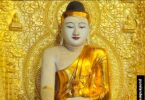
As taught in ‘Guānshìyīn Bodhisattva’s Universal Door Chapter’《观世音菩萨普门品》in the ‘Wonderful Dharma Lotus Flower Sūtra’《妙法莲华经》, ‘If the three-thousandfold great-thousandfold world, is full within with yakshas and rākṣasas, desiring to come to trouble people, hearing them recite that Guānshìyīn Púsà’s name [which is usually expressed as ‘Námó Guānshìyīn Púsà’: Homage to and refuge for life in Guānshìyīn Púsà: 南无观世音菩萨: with seven words], all these evil ghosts, will yet, be not able to, with their evil eyes see them, moreover to do harm.’ (若三千大千国土,满中夜叉罗刹,欲来恼人,闻其称观世音菩萨名者,是诸恶鬼,尚不能以恶眼视之,况复加害?)
In short, sincere mindfulness of the Bodhisattva’s name will avert all ghostly troubles, no matter how many ghosts there are. In fact, ghosts with the intention to create trouble might feel troubled instead, as the ones they want to trouble cannot even be seen! This is possible as with connection to the Bodhisattva’s blessings, one is rendered ‘invisible’, thus instantly protected, since troublemakers cannot harm those they cannot see.

Interestingly, when there is mindfulness of the Bodhisattva’s teacher’s name ‘Āmítuófó’ (阿弥陀佛) or ‘Námó Āmítuófó’ (南无阿弥陀佛: with six words), there will be connection to the bright light of his blessings. As taught by the Pure Land Tradition’s 9th Patriarch Great Master Ǒuyì (净土宗九祖蕅益大师) in his ‘Spirit Peak Tradition’s Treatise’《灵峰宗论》, ‘[O]nce reciting the Buddha’s name, from your chest, suddenly extends five-coloured (i.e. varicoloured) light, that radiates for more than 10 zhàngs (33.3 metres), that dazzles… [ghosts’] minds and eyes, to not be able to again come near… [G]hosts who did not plant good roots, not having heard the Buddha’s name before, thus become surprised and fearful.’ (一念佛,胸辄舒五色光十余丈,眩[鬼]心目,不能复近… 鬼不种善根,不闻佛名,故惊怖。)
While the protective effects of mindfulness of the Bodhisattva and Buddha seem to differ, they might be essentially similar. According to a Dharma Master’s explanation, when there is mindfulness as above, there will be strong yáng (阳) (or positive and bright) energy, which ghosts cannot see (directly), as they are of yīn (阴) (or negative and dull) energy, and are attracted to those with similar energy. This is how the one mindful can effectively become invisible to ghosts.
If mindfulness of the Bodhisattva and Buddha have similar protective effects, the main issue for consideration would be whose name to be mindful of. While a key factor is one’s personal affinity, another important key factor will be the ease of practice – especially in an emergency. While greater affinity can be built and strengthened either way, there is practical advantage that the Buddha’s name is shorter, making it easier to be mindful.
This is so, unless only ‘Guānyīn Púsà’ (观音菩萨) is recited, as the shortest form of the Bodhisattva’s name, which makes it also four-worded like ‘Āmítuófó’. Although not commonly practised, this should work too. As the Bodhisattva is a remanifestation of the ancient Buddha Brightness Of Right Dharma Thus Come One (正法明如来), she is also connected to Āmítuófó and all other Buddhas. In this sense, to be mindful of one is to connect to all at the same time.
But what if one experiences ghostly disturbance when not mindful of the Buddha or Bodhisattva, while unable to do it in time to receive protection? When there is regular, sincere and diligent practice in everyday life, there are correspondingly lower chances for disturbances in everyday life. However, there can still be fear that one’s practice might not be enough to effect more or less constant protection.
This is where wearing of a Śūraṅgama Mantra (楞严咒) pendant can be helpful for assurance. As taught by Śākyamuni Buddha (释迦牟尼佛) in the Śūraṅgama Sūtra《楞严经》, ‘Wholeheartedly encourage and enable upholding of my Buddha Crown’s Dhāraṇī [Śūraṅgama] Mantra. If there are those yet able to recite it, writing it for placing in their meditation halls [to prevent supernatural disturbances during spiritual practice], or wearing it on their bodies, they are by all demonic beings, not able to be touched.’ (一心劝令,持我佛顶陀罗尼[楞严]咒。若未能诵,写于禅堂,或带身上,一切诸魔,所不能动。)
However, there should not be excess reliance on it, as depending on one’s karma, it might be lost or unavailable during an emergency. (Also, one’s consciousness, if away from the body, cannot wear the mantra physically for protection.) Meanwhile, one’s mind is always present, with which mindfulness of the Buddha or Bodhisattva, or even the mantra can be practised.

What about curses or hexes from witchcraft, that might not involve ghosts? How can they be avoided? The ‘Universal Door Chapter’《普门品》also states that, ‘Of curses and all poisons, those desired to harm the body, with mindfulness of that power Guānyīn’s power, will return to be received by their originating persons.’ (咒诅诸毒药,所欲害身者,念彼观音力,还著于本人。)
In short, sincere mindfulness of the Bodhisattva’s name will avert all harmful influences from black magic, voodoo and such. Even poisons’ deadly effects will be avoided. Again, with Buddhas representing unsurpassable spiritual power, mindfulness of Buddha should have similar protective effects.
(As Guānyīn Bodhisattva has perfect compassion and no spite, it should not be mistaken that she is the one actively sending back the intended harm to punish the evil-doer. This deflection or reflection of harm to the evil-doer is a natural karmic effect, as one who is mindful of Guānyīn Bodhisattva is protected by her offering of an ‘armour’ of blessings.
Also, when it comes to evil spirits being able to harm a potential victim, one must have some corresponding spiritual defilements, with greed and hatred especially, and the negative karma to be harmed. Since the person mindful of Guānyīn Bodhisattva is tuning to one’s own pure Buddha-nature while connecting to her blessings that dilutes negative karma, this person cannot be harmed. It is the evil-doer then, who is the immediate one with corresponding defilements, who gets harmed. The above teaching also serves as a skilful deterrence, to warn against the doing of such evil, with which one has to taste its bitter fruits.)
Again, what if one receives a curse (or poison) when not mindful of the Buddha or Bodhisattva? Again, this is where wearing of a Śūraṅgama Mantra pendant can be helpful. Also taught in the Śūraṅgama Sūtra《楞严经》, ‘[If] these persons’ minds are confused, yet to be able to recite and recollect [the Śūraṅgama Mantra], perhaps wearing it on their bodies, perhaps writing it at home within, it should be known that these persons, to the end of their living years, are by all poisons not able to be harmed.’ (是人心昏,未能诵忆。或带身上。或书宅中。当知是人尽其生年,一切诸毒所不能害。) These ‘poisons’ mentioned include witchcraft poisons (蛊毒) and curses too.
In summary, those regularly mindful of a Buddha or Bodhisattva, who also wear the Śūraṅgama Mantra, will be able to avoid all supernatural disturbances and curses. More importantly, ‘To observe the Precepts well, is to avoid ghostly woes well. To break the Precepts well, is to invite ghostly woes well.’ Āmítuófó!
相关经典
Related Sūtra:
《观世音菩萨普门品》
Contemplator Of The World’s Sounds (Guānshìyīn) Bodhisattva’s Universal Door Chapter
https://purelanders.com/pumenpin
相关文章
Related Articles:
How To Help The Possessed With Mindfulness Of Buddha
如何以念佛帮助被附体者
(A Buddhist ‘Exorcism’ Method 一个佛教祛鬼降魔的妙法)
https://purelanders.com/2021/04/11/how-to-help-the-possessed-with-mindfulness-of-buddha
念佛者不受恶鬼与猛兽所害
Mindfulness Of Āmítuófó Protects From Evil Ghosts & Ferocious Beasts
https://purelanders.com/2021/01/04/how-are-those-mindful-of-amituofo-protected-from-evil-ghosts-and-ferocious-beasts
防魔偈
Verses On Prevention Of The Demonic
https://purelanders.com/2021/05/10/verses-on-prevention-of-the-demonic
How Buddhists Can Prevent Harm From Black Magic
https://thedailyenlightenment.com/2014/06/how-buddhists-can-prevent-harm-from-black-magic





